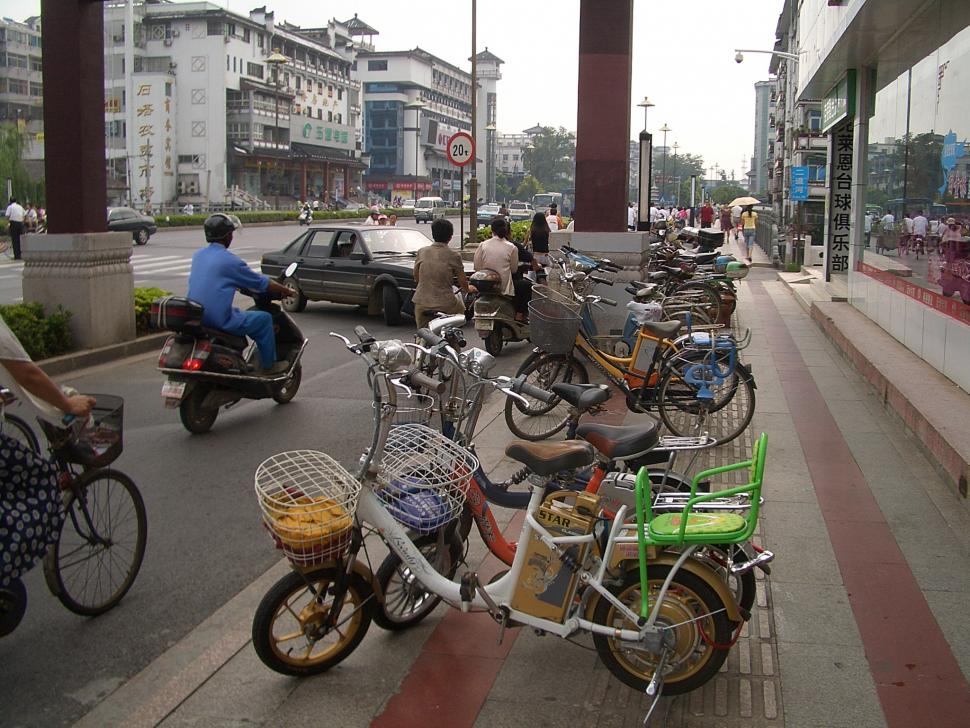- News
- Reviews
- Bikes
- Components
- Bar tape & grips
- Bottom brackets
- Brake & gear cables
- Brake & STI levers
- Brake pads & spares
- Brakes
- Cassettes & freewheels
- Chains
- Chainsets & chainrings
- Derailleurs - front
- Derailleurs - rear
- Forks
- Gear levers & shifters
- Groupsets
- Handlebars & extensions
- Headsets
- Hubs
- Inner tubes
- Pedals
- Quick releases & skewers
- Saddles
- Seatposts
- Stems
- Wheels
- Tyres
- Tubeless valves
- Accessories
- Accessories - misc
- Computer mounts
- Bags
- Bar ends
- Bike bags & cases
- Bottle cages
- Bottles
- Cameras
- Car racks
- Child seats
- Computers
- Glasses
- GPS units
- Helmets
- Lights - front
- Lights - rear
- Lights - sets
- Locks
- Mirrors
- Mudguards
- Racks
- Pumps & CO2 inflators
- Puncture kits
- Reflectives
- Smart watches
- Stands and racks
- Trailers
- Clothing
- Health, fitness and nutrition
- Tools and workshop
- Miscellaneous
- Buyers Guides
- Features
- Forum
- Recommends
- Podcast
 Yangzhou-WenchangLu-electric-bicycles by Vmenkov (https://commons.wikimedia.org/wiki/User:Vmenkov)
Yangzhou-WenchangLu-electric-bicycles by Vmenkov (https://commons.wikimedia.org/wiki/User:Vmenkov)Taiwan to introduce e-bike licensing and helmet law
Taiwan’s Transport Ministry has proposed law changes that mean electric bike riders will need a licence and a helmet to ride.
Reported by the Taipei Times, the changes come amid a reported increase in collisions and traffic violations involving riders of some of the country’s 180,000 electric bicycles.
While e-bikes are highly popular in many European countries, notably among older people, and are subject to the same rules as pedal cycles, in Taiwan they will soon be legally defined as a lightweight scooter, if changes to the Road Traffic Management and Penalty Act are enacted. Riders will need to pass a written and practical test to ride one. The changes follow a series of e-bike clampdowns in China.
Power assist front wheel smashes Kickstarter target – but best read the small print
According to police statistics the number of people injured by electric bikes rose from 369 in 2011 to 1,495 in Taiwan last year – meaning one in every 120 of the country’s bikes was involved in a crash in the 12 months of 2015 - while the death toll rose from zero to four in the same period.
E-bikes will no longer be permitted on pavements, following complaints about risks posed to pedestrians. Manufacturers will need to ensure the bike’s maximum speed – set at 25kph - can’t be increased, while E-bikes sold after July 1 must carry a new larger certification label.
In China, meanwhile, e-bike riders have suffered repeated crackdowns, with Shenzhen city police banning e-bikes from 90 per cent of city roads in 2012, on the grounds they compete with motor cars and run red lights. According to Sixth Tone, police announced last month that a quarter of the 431 road traffic deaths in the previous 12 months involved some of the city’s 4 million e-bikes and reportedly confiscated 18,000 e-bikes and detained 8,000 riders in ten just days in March in a bid to eradicate what is branded a “silent killer”.
Shortly afterwards Beijing police banned e-bikes from several major streets in the city centre.
Some believe such moves are discriminatory against migrant workforces who rely heavily on e-bikes for cheap transportation. In the mid-1990s policies were introduced banning or restricting motorbikes in large Chinese cities, which helped boost e-bike popularity.
Laura Laker is a freelance journalist with more than a decade’s experience covering cycling, walking and wheeling (and other means of transport). Beginning her career with road.cc, Laura has also written for national and specialist titles of all stripes. One part of the popular Streets Ahead podcast, she sometimes appears as a talking head on TV and radio, and in real life at conferences and festivals. She is also the author of Potholes and Pavements: a Bumpy Ride on Britain’s National Cycle Network.
Latest Comments
- Rendel Harris 24 min 16 sec ago
Not every freehub makes a noise, especially older ones manufactured before sounding like a Maxim gun apparently became a badge of honour.
- ubercurmudgeon 54 min 53 sec ago
Some quotes need to be put around the word "reciprocal" in the first paragraph.
- David9694 1 hour 30 min ago
this one is wide open for puns, come on people.
- BikingBud 1 hour 31 min ago
Do you mean this woman, who got out to marshall the truck through and is now walking back to said Wankpanzer which is blocking the road again as it...
- mark1a 1 hour 46 min ago
This simply isn't true. I've been running radar lights for 10 years now. I cycle mostly on rural roads, I get notified of approaching vehicles up...
- Rendel Harris 4 hours 16 min ago
Genuinely puzzled as to how you've extrapolated that from what I said. Care to explain?
- Pub bike 6 hours 27 min ago
He is up against the global trading system, which has obviously been in the news a lot lately. Framebuilders in other countries can undercut him,...
- Destroyer666 19 hours 50 min ago
Have you owned Bont shoes? In my experience even the widest Lake shoes have had a bizarre form of narrowing way too much in the toe area. But the...
Add new comment
1 comments
those e-bikes in that photo really stretch the definition of an electrically assisted bicycle. I'm pretty sure those pedals and the chain are merely there to jump through the hoop... those batteries and motors are massive and it looks like most riders merely use the twist grip throttle...